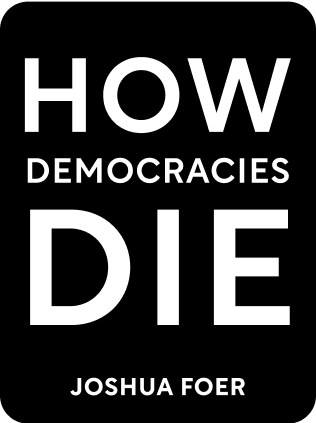

This article is an excerpt from the Shortform book guide to "How Democracies Die" by Steven Levitsky and Daniel Ziblatt. Shortform has the world's best summaries and analyses of books you should be reading.
Like this article? Sign up for a free trial here .
Is the restoration of democracy possible? Does American democracy need to be restored, and what steps are required to make it happen?
After years of authoritarianism and testing democratic norms, the U.S. faces challenges to our democracy like never before. In the Trump era and beyond, restoration of democracy needs to take center stage.
Read more about restoration of democracy below.
How to Restore Democracy
Based on Trump’s behavior in office, it is clear that American democracy is going to be facing strong challenges—in the Trump era and beyond. There are three key factors that will determine whether or not democratic norms survive in American politics. They are:
- The behavior of party leaders (particularly Republicans)
- Public opinion
- The possibility of crises like war or terrorist attacks
Let’s explore these in greater detail.
Loyalty, Containment, and Confrontation: Party Leaders’ Choices
As we’ve seen, political parties are the best gatekeepers of democracy. The options party leaders face when dealing with an authoritarian in their own ranks are loyalty, containment, and confrontation. This is why the restoration of democracy is so important.
There are a few ways that parties remain loyal to authoritarian leaders. They can actively enable the autocrat by willingly repeating his lies, amplifying his attacks, and vigorously defending him against opponents. Or they can more passively empower him, either by remaining silent on his most aggressive violations of democratic norms, or issuing only mild criticisms without taking any concrete action.
Alternatively, party leaders might opt for a containment strategy, in which they side with the leader on traditional matters of party orthodoxy, but draw a line against the more egregious democratic norm-breaking. Thus, a Republican Congress pursuing a containment strategy might vote for Trump’s tax cuts, but oppose his efforts to politicize federal law enforcement.
This “have one’s cake and eat it too” strategy is usually difficult to maintain, as party leaders know that their own political fortunes are tied to the success of the leader’s initiatives. If they stymie him too much, they will pay a political price. But by giving him victories on legislative matters, they help make him more popular with the public, which only increases his authoritarian power.
Lastly, party leaders can opt for a confrontation strategy. This would entail the party actively mobilizing and crossing party lines to remove the leader through the impeachment process or calling on him to resign.
(Shortform note: In 2019, it was revealed that the Trump administration had withheld military aid from Ukraine in order to pressure the Ukrainian government into launching an investigation into the business dealings of Hunter Biden, son of Trump’s Democratic rival Joe Biden. Based on the GOP’s steadfast support for Trump during this affair and their near-unanimous vote against the resulting impeachment charges in both the House and Senate, it appears that the party is not opting for a containment strategy with regard to Trump—and may, instead, be coalescing around a strategy of active collaboration.)
Public Opinion
The second major factor is public opinion. The more popular they are, the more successful an authoritarian will be in destroying democracy. Authoritarians are strengthened—and their opponents demoralized—when public opinion is on their side. When they choose to enable the leader’s norm-breaking behavior, high-ranking party officials can play a significant role in boosting his popularity by signaling to the public that the opposition to him is merely partisan. Approval ratings of leaders are also influenced by the state of the economy and external events like wars and terrorist attacks over which political leaders have less direct control.
External Crises
This brings us to the third factor that will determine the survival of US democracy—external crises like terrorist attacks or wars. In the aftermath of such events, a “rally-around-the-flag” effect tends to boost public support for the government.
The entire political system, including judges, law enforcement, and legislatures, tends to bend to the will of the executive under these circumstances, granting them extraordinary powers and deference. From Abraham Lincoln’s suspension of constitutional rights like habeas corpus during the Civil War to Franklin Roosevelt’s internment of Japanese-Americans during World War Two, presidents have enjoyed greatly expanded powers during times of crisis.
But while these were extraordinary acts from leaders who were otherwise strongly committed to democratic norms, Trump’s behavior in office demonstrates that he has no such commitment. A national emergency could provide a dangerous opportunity for an anti-democratic politician like him to mount an effective assault on America’s already-weakened democratic norms, proving the need for a restoration of democracy.

———End of Preview———
Like what you just read? Read the rest of the world's best book summary and analysis of Steven Levitsky and Daniel Ziblatt's "How Democracies Die" at Shortform .
Here's what you'll find in our full How Democracies Die summary :
- How shared norms are essential for preserving democracy
- Why the Trump presidency threatened those shared norms
- Why democracy goes beyond individual leaders and parties and must be a shared enterprise among committed individuals






